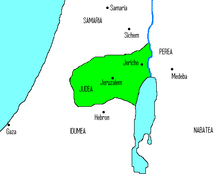Maccabean revolt
| Maccabean Revolt | |||||||
|---|---|---|---|---|---|---|---|
 Judea under Judas Maccabeus during the revolt |
|||||||
|
|||||||
| Belligerents | |||||||
|
|
|
||||||
| Commanders and leaders | |||||||
|
Mattathias Judah Maccabee (KIA) Jonathan Apphus Eleazar Avaran (KIA) Simon Thassi John Gaddi (KIA) |
Antiochus IV Epiphanes Antiochus V Eupator Demetrius I Soter Lysias Gorgias Nicanor (KIA) Bacchides |
||||||
| Units involved | |||||||
| Judean/Maccabean rebels | Seleucid army | ||||||
The Maccabean Revolt (Hebrew: מרד החשמונאים; Greek: Επανάσταση των Μακκαβαίων) was a Jewish rebellion, lasting from 167 to 160 BC, led by the Maccabees against the Seleucid Empire and the Hellenistic influence on Jewish life.
In the narrative of I Maccabees, after Antiochus issued his decrees forbidding Jewish religious practice, a rural Jewish priest from Modiin, Mattathias the Hasmonean, sparked the revolt against the Seleucid Empire by refusing to worship the Greek gods. Mattathias killed a Hellenistic Jew who stepped forward to offer a sacrifice to an idol in Mattathias' place. He and his five sons fled to the wilderness of Judah. After Mattathias' death about one year later in 166 BC, his son Judah Maccabee led an army of Jewish dissidents to victory over the Seleucid dynasty in guerrilla warfare, which at first was directed against Hellenized Jews, of whom there were many. The Maccabees destroyed pagan altars in the villages, circumcised boys and forced Hellenized Jews into outlawry. The term Maccabees as used to describe the Jewish army is taken from the Hebrew word for "hammer".
The revolt itself involved many battles, in which the light,quick and mobile Maccabean forces gained notoriety among the slow and bulky Seleucid army,and also for their use of guerrilla tactics. After the victory, the Maccabees entered Jerusalem in triumph and ritually cleansed the Temple, reestablishing traditional Jewish worship there and installing Jonathan Maccabee as high priest. A large Seleucid army was sent to quash the revolt, but returned to Syria on the death of Antiochus IV. Its commander Lysias, preoccupied with internal Seleucid affairs, agreed to a political compromise that restored religious freedom.
...
Wikipedia
